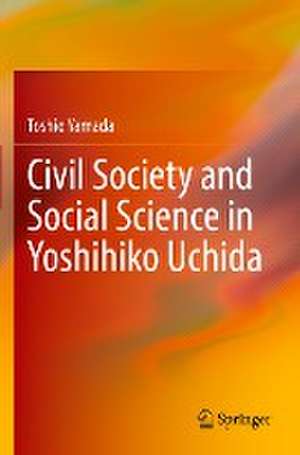Civil Society and Social Science in Yoshihiko Uchida
Autor Toshio Yamadaen Limba Engleză Paperback – 8 apr 2023
| Toate formatele și edițiile | Preț | Express |
|---|---|---|
| Paperback (1) | 632.55 lei 6-8 săpt. | |
| Springer Nature Singapore – 8 apr 2023 | 632.55 lei 6-8 săpt. | |
| Hardback (1) | 638.76 lei 6-8 săpt. | |
| Springer Nature Singapore – 7 apr 2022 | 638.76 lei 6-8 săpt. |
Preț: 632.55 lei
Preț vechi: 744.18 lei
-15% Nou
Puncte Express: 949
Preț estimativ în valută:
121.05€ • 125.06$ • 100.75£
121.05€ • 125.06$ • 100.75£
Carte tipărită la comandă
Livrare economică 26 martie-09 aprilie
Preluare comenzi: 021 569.72.76
Specificații
ISBN-13: 9789811911408
ISBN-10: 9811911401
Pagini: 117
Ilustrații: XV, 117 p. 1 illus.
Dimensiuni: 155 x 235 mm
Greutate: 0.2 kg
Ediția:1st ed. 2022
Editura: Springer Nature Singapore
Colecția Springer
Locul publicării:Singapore, Singapore
ISBN-10: 9811911401
Pagini: 117
Ilustrații: XV, 117 p. 1 illus.
Dimensiuni: 155 x 235 mm
Greutate: 0.2 kg
Ediția:1st ed. 2022
Editura: Springer Nature Singapore
Colecția Springer
Locul publicării:Singapore, Singapore
Cuprins
Introduction to Yoshihiko Uchida.- The Origin and Development of Uchida’s Social Science.- Civil Society and the Metabolic Relationship Between Human Beings and Nature.- Science and Inquiry in Hajime Kawakami.- Invisible Hand and Manipulative Hand.- In Closing: How to Live in a Society Organized Around the Division of Labor.
Notă biografică
Toshio Yamada is an emeritus professor at Nagoya University in Japan, having previously served as Professor of economic theory at various institutions including Osaka City University and Nagoya University. He has served as a member of the board of directors of several academic associations, including, inter alia, The Japanese Society for the History of Economic Thought and The Japan Association for Evolutionary Economics. His works in English include Japanese Capitalism in Crisis, co-edited with Robert Boyer, Routledge, 2000; Evolving Diversity and Interdependence of Capitalism, co-edited with Robert Boyer et al., Springer, 2018; and Contemporary Capitalism and Civil Society, Springer, 2018.
Textul de pe ultima copertă
This book introduces the work of Yoshihiko Uchida (1913–1989), one of the most prominent Japanese thinkers on the topic of civil society in the post-World War II era. The distinctive features of Uchida’s approach to civil society are his view of the metabolic relationship between human beings and nature and his call for a social science rooted in the experiences and inquiries of ordinary citizens. This original approach did not develop in a straight line from Uchida’s early work to his mature period, and this book follows the twists and turns in its formation through his reflections on the relationships between “the civil” and “the capitalistic,” “the modern” and “the pre-modern,” “the historical” and “the trans-historical,” and “science by specialists” and “inquiry by laypeople.” As a historian of economic thought, Uchida pursued these topical themes by examining figures such as Adam Smith, Karl Marx, and Hajime Kawakami, a prominent thinker in Japan. By casting a light on these inquiries, this book offers the first depiction of Uchida’s body of work as a whole and in doing so illuminates the emergence of original democratic thought in post-war Japan.
Caracteristici
Clarifies an important theoretical basis of democracy in post-war Japan Analyzes the formation of a civil society theory peculiar to Japan Introduces to non-Japanese-speaking people Yoshihiko Uchida’s achievement in its totality
